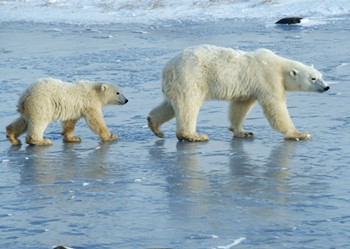
The same signs appear in young male mammoth tusks, but those living in North America at the end of Ice Age laid down their stress rings three years earlier than usual. In other words, it seems that young males were leaving the herd at an earlier age.
在年輕雄性猛犸象的象牙上也顯示了同樣的信息,但是在冰河時(shí)代末期,那些生活在北美的猛犸象卻提前三年開(kāi)始自謀生路。換言之,似乎那些年輕的雄性猛犸象很早就離開(kāi)了族群。
Some scientists believe the only thing that could cause such a major change in mammoth’s social structure would be hunting by humans. If hunting pressure was extreme enough to push the mammoths to extinction, then we would expect them to survive in areas that people couldn’t reach. And for a while, they did, here on Wrangel Island off the coast of Siberia.
一些科學(xué)家認(rèn)為,唯一導(dǎo)致猛犸象社會(huì)結(jié)構(gòu)主要變化的原因就是人類的捕殺。如果獵殺的程度已經(jīng)導(dǎo)致它們滅亡,那么它們也只有在人類觸及不到的地區(qū)才能存活。事實(shí)上的卻如此,在西伯利亞海岸的弗蘭格爾島上,它們的確幸存了。
There are no mammoths on Wrangel Island today, but it is home to another large animal, the polar bear. And there is evidence that polar bears and mammoths once lived side by side during the last Ice Age. They would have shared the island’s meager offerings.
如今,弗蘭格爾島上已經(jīng)沒(méi)有猛犸象了,但是這里卻又另一種大型動(dòng)物——北極熊。有證據(jù)顯示在冰河時(shí)代末期,猛犸象曾和北極熊共同定居于此。他們共同分享著這個(gè)貧瘠之地能給予它們的一切。
This inhospitable and isolated place seems to have been a sanctuary for mammoths. The Wrangel Island herds were the last on the planet to survive. Remarkably, they survived here long after their North American relatives had all died out. But they were still on borrowed time. When people finally reached Wrangel Island 4,000 years ago, these last remaining mammoths also became extinct.
這個(gè)荒涼并與世隔絕的地方似乎對(duì)于猛犸系來(lái)說(shuō)是一個(gè)天然的庇護(hù)所。遷徙到弗蘭格爾島的猛犸象是地球上最后一支猛犸象族群了。很明顯,他們?cè)谶@里得以幸存,而它們的其他族群都已滅絕。然而,它們也只不過(guò)是延長(zhǎng)了死亡的時(shí)間而已。當(dāng)4000年前,人類最終找到弗蘭格爾島后,這里的最后一支猛犸象族群也滅絕了。
The events on Wrangel Island mirrored what had happened on the North American continent. Mammoths only became extinct after they came into contact with people.
弗蘭格爾島的這個(gè)事件反映了北美大陸的狀況。在與人類接觸后,猛犸象便會(huì)滅絕。
英文文本來(lái)自普特英語(yǔ),譯文屬可可原創(chuàng),僅供學(xué)習(xí)交流使用,未經(jīng)許可不得轉(zhuǎn)載。











